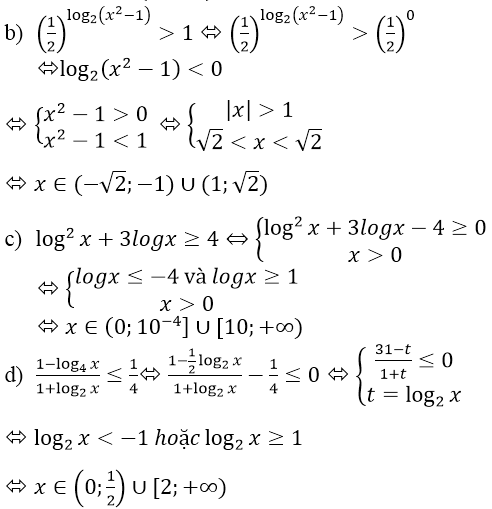Giải phương trình : \(\log^2_{\frac{1}{2}}x^2-\log_4x^4-20=0\)
Hãy nhập câu hỏi của bạn vào đây, nếu là tài khoản VIP, bạn sẽ được ưu tiên trả lời.




Điều kiện để phương trình có nghĩa: x > 0.
Biến đổi phương trình như sau:
\(2\log_2^2x-14\log_{2^2}x+3=0\)
\(\Leftrightarrow2\log_2^2x-14.\dfrac{1}{2}\log_2x+3=0\)
\(\Leftrightarrow2\log_2^2x-7\log_2x+3=0\)
\(\Leftrightarrow\left[{}\begin{matrix}\log_2x=3\\\log_2x=\dfrac{1}{2}\end{matrix}\right.\)
\(\Leftrightarrow\left[{}\begin{matrix}x=2^3\\x=2^{\dfrac{1}{2}}\end{matrix}\right.\)
\(\Leftrightarrow\left[{}\begin{matrix}x=8\\x=\sqrt{2}\end{matrix}\right.\)
(Cả hai nghiệm đều thỏa mãn)

a: ĐKXĐ: \(x\notin\left\{\dfrac{5}{2}\right\}\)
\(\log_32x-5=3\)
=>\(log_3\left(2x-5\right)=log_327\)
=>2x-5=27
=>2x=32
=>x=16(nhận)
b: ĐKXĐ: x<>0
\(\log_4x^2=2\)
=>\(log_4x^2=log_416\)
=>\(x^2=16\)
=>\(\left[{}\begin{matrix}x=4\left(nhận\right)\\x=-4\left(nhận\right)\end{matrix}\right.\)
c: ĐKXĐ: \(x\notin\left\{\dfrac{1}{3};-\dfrac{5}{2}\right\}\)
\(\log_7\left(3x-1\right)=\log_7\left(2x+5\right)\)
=>3x-1=2x+5
=>x=6(nhận)
d: ĐKXĐ: \(x\notin\left\{1;-1;\dfrac{-1+\sqrt{13}}{4};\dfrac{-1-\sqrt{13}}{4}\right\}\)
\(ln\left(4x^2+2x-3\right)=ln\left(3x^2-3\right)\)
=>\(4x^2+2x-3=3x^2-3\)
=>\(x^2+2x=0\)
=>x(x+2)=0
=>\(\left[{}\begin{matrix}x=0\\x+2=0\end{matrix}\right.\Leftrightarrow\left[{}\begin{matrix}x=0\left(nhận\right)\\x=-2\left(nhận\right)\end{matrix}\right.\)
e: ĐKXĐ: \(x\notin\left\{-\dfrac{3}{2};\dfrac{1}{3}\right\}\)
\(log\left(2x+3\right)=log\left(1-3x\right)\)
=>2x+3=1-3x
=>5x=-2
=>\(x=-\dfrac{2}{5}\left(nhận\right)\)

a)
ĐK: \(\left\{{}\begin{matrix}2x-4>0\\x-1>0\end{matrix}\right.\Leftrightarrow x>1\)
\(\log_5\left(2x-4\right)+\log_{\dfrac{1}{5}}\left(x-1\right)=0\\ \Leftrightarrow\log_5\left(2x-4\right)-\log_5\left(x-1\right)=0\\ \Leftrightarrow\log_5\left(\dfrac{2x-4}{x-1}\right)=\log_51\\ \Leftrightarrow\dfrac{2x-4}{x-1}=1\\ \Leftrightarrow2x-4=x-1\\ \Leftrightarrow x=3\left(tm\right)\)
Vậy x = 3.
b) ĐK: x > 0
\(\log_2x+\log_4x=3\\ \Leftrightarrow\log_2x+\dfrac{1}{2}\log_2x=3\\ \Leftrightarrow\left(1+\dfrac{1}{2}\right)\log_2x=3\\ \Leftrightarrow\dfrac{3}{2}\log_2x=3\\ \Leftrightarrow\log_2x=2\\ \Leftrightarrow x=4\left(tm\right)\)
Vậy x= 4

d) Điều kiện x>0. Áp dụng công thức đổi cơ số, ta có :
\(\log_2x+\log_3x+\log_4x=\log_{20}x\)
\(\Leftrightarrow\log_2x+\frac{\log_2x}{\log_23}+\frac{\log_2x}{\log_24}=\frac{\log_2x}{\log_220}\)
\(\Leftrightarrow\log_2x\left(1+\frac{1}{\log_23}+\frac{1}{2}+\frac{1}{\log_220}\right)=0\)
\(\Leftrightarrow\log_2x\left(\frac{3}{2}+\log_22-\log_{20}2\right)=0\)
Ta có \(\frac{3}{2}+\log_22-\log_{20}2>\frac{3}{2}+0-1>0\)
Do đó, từ phương trình trên, ta phải có \(\log_2x=0\) hay \(x=2^0=1\)
Vậy nghiệm duy nhất của phương trình là \(x=1\)
c) Điều kiện x>0, đưa về cùng cơ số 5, ta có :
\(\log_5x^3+3\log_{25}x+\log_{\sqrt{25}}\sqrt{x^3}=\frac{11}{2}\)
\(\Leftrightarrow3\log_5x+3\log_{5^2}x+\log_{5^{\frac{3}{2}}}x^{\frac{3}{2}}=\frac{11}{2}\)
\(\Leftrightarrow3\log_5x+3\frac{1}{2}\log_5x+\frac{3}{2}.\frac{2}{3}\log_5x=\frac{11}{2}\)
\(\Leftrightarrow\frac{11}{2}\log_5x=\frac{11}{2}\)
\(\Leftrightarrow\log_5x=1\)
\(\Leftrightarrow x=5^1=5\) thỏa mãn
Vậy phương trình chỉ có 1 nghiệ duy nhất \(x=5\)

\(a,3^x>\dfrac{1}{243}\\ \Leftrightarrow3^x>3^{-5}\\ \Leftrightarrow x>-5\\ b,\left(\dfrac{2}{3}\right)^{3x-7}\le\dfrac{3}{2}\\ \Leftrightarrow3x-7\le1\\ \Leftrightarrow3x\le8\\ \Leftrightarrow x\le\dfrac{8}{3}\\ c,4^{x+3}\ge32^x\\ \Leftrightarrow2^{2x+6}\ge2^{5x}\\ \Leftrightarrow2x+6\ge5x\\ \Leftrightarrow3x\le6\\ \Leftrightarrow x\le2\)
d, Điều kiện: x > 1
\(log\left(x-1\right)< 0\\ \Leftrightarrow x-1< 1\\ \Leftrightarrow1< x< 2\)
e, Điều kiện: \(x>\dfrac{1}{2}\)
\(log_{\dfrac{1}{5}}\left(2x-1\right)\ge log_{\dfrac{1}{5}}\left(x+3\right)\\ \Leftrightarrow2x-1\ge x+3\\ \Leftrightarrow x\ge4\)
f, Điều kiện: x > 4
\(ln\left(x+3\right)\ge ln\left(2x-8\right)\\ \Leftrightarrow x+3\ge2x-8\\\Leftrightarrow4< x\le11\)




-log22 x2_ log2x2- 20=0
↔ pt này vô ng bạn ơi!!! xem lại đầu bài.
Bài này phương trình có tận 4 nghiệm chứ không phải vô nghiệm đâu bạn Đỗ đại học nhé
Điều kiện \(x\ne0\)
Ta có từ phương trình ban đầu cho \(\Leftrightarrow4\log_2^2\left|x\right|-2\log_2\left|x\right|-20=0\)
\(\Leftrightarrow2\log_2^2\left|x\right|-\log_2\left|x\right|-10=0\)
Đặt \(t=\log_2\left|x\right|\) ta được phương trình \(2t^2-t-10=0\Leftrightarrow\begin{cases}t=-2\\t=\frac{5}{2}\end{cases}\)
Với \(t=2\Rightarrow\log_2\left|x\right|=-2\Leftrightarrow\left|x\right|=\frac{1}{4}\Leftrightarrow x=\pm\frac{1}{4}\)
Với \(t=\frac{5}{2}\Rightarrow\log_2\left|x\right|=\frac{5}{2}\Leftrightarrow\left|x\right|=\sqrt{32}\Leftrightarrow x=\pm\sqrt{32}\)
Vậy phương trình có 4 nghiệm : \(x=\frac{1}{4};x=-\frac{1}{4};x=\sqrt{32};x=-\sqrt{32}\)